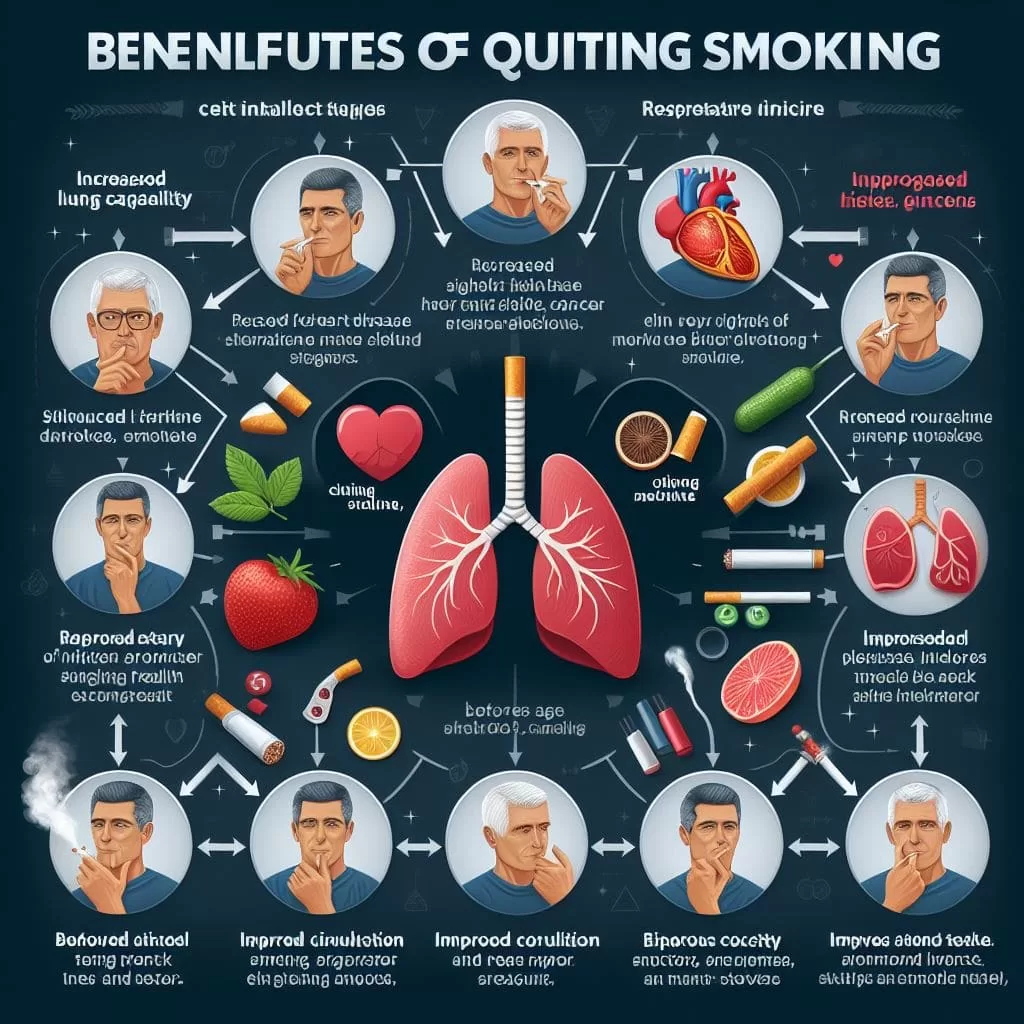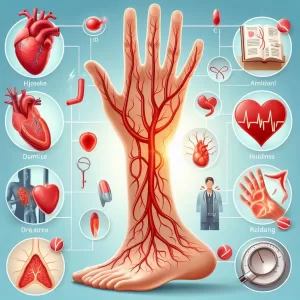What Happens When You Quit Smoking?
Even if you’ve smoked for many years, you can reverse the harmful effects of smoking and experience health benefits from the first hours you stop smoking to the decades after you quit.
Smoking releases thousands of chemicals into your body. The result isn’t only damage to your lungs, but also your heart and many other body structures.
Below are some of the many health milestones you can experience by quitting smoking today.

What happens to your body when you suddenly stop smoking?
The positive health effects of quitting smoking begin 20 minutes after your last cigarette. Your blood pressure and pulse will start to return to more normal levels.
In addition, fibers in the bronchial tubes that previously didn’t move well due to constant exposure to smoke will start to move again. This is beneficial for the lungs: These fibers help move irritants and bacteria out of the lungs, helping reduce the risk of infection.
after 8 hours of not smoking
Within eight hours, your carbon monoxide levels will return to a more normal level. Carbon monoxide is a chemical present in cigarette smoke that replaces oxygen particles in the blood, lowering the amount of oxygen your tissues receive.
When carbon monoxide goes away, your oxygen levels start to increase to more normal levels. This increased oxygen helps nourish tissues and blood vessels that were getting less oxygen while you were smoking.
After 24 hours of not smoking
By the one-day mark, the nicotine level in your blood drops to a negligible amount.
By then, reduced constriction of veins and arteries and an increase in the oxygen levels that go to the heart help boost the functioning of your heart. This decreases your chance of getting a heart attack.
After 48 hours of not smoking
At 48 hours, previously damaged nerve endings start to regrow. You may also start to notice that senses that were previously dulled due to smoking have improved. You may realize you’re smelling and tasting things better than you were before.
After 72 hours of not smoking
Within three days of quitting smoking, you’ll often find yourself breathing more easily. This is because the bronchial tubes inside the lungs have started to relax and open up more. This makes air exchange between carbon dioxide and oxygen easier.
In addition, your lung capacity, or the ability of the lungs to fill up with air, increases about three days after quitting.
After 7 days of not smoking
After a week without smoking, the carbon monoxide in your blood drops to normal levels.
Remember, the chances of quitting smoking for good increase with every attempt. If you can make it to one week, you can make it for a lifetime.
After two weeks of not smoking,
Within two weeks of quitting smoking, you may start to notice you’re not only breathing easier. You’re also walking easier. This is thanks to improved circulation and oxygenation.
Your lung function also increases by as much as 30% about two weeks after stopping smoking, according to the American Lung Association.
After a month of not smoking
In just one short month, you can experience many health changes related to stopping smoking. One is feeling a sense of heightened overall energy.
You may also notice that many smoking-related symptoms have decreased, such as sinus congestion and shortness of breath, with exercise.
In addition to these benefits, fibers in the lungs that help keep the lungs healthy are growing back. These fibers can help reduce excess mucus buildup and protect against bacterial infections.
Finally, those who make it for one month without smoking are 5 times more likely to quit for good.
After 3 months of not smoking
Within three months after quitting, a woman can improve her fertility as well as reduce the risk that her baby will be born prematurely.
After 6 months of not smoking
After six months of quitting, many people often notice they’re better able to handle stressful events that come their way without feeling like they need to smoke.
They may also notice they’re coughing up much less mucus and phlegm. This is because the airways are much less inflamed without constant exposure to cigarette smoke and the chemicals contained within cigarettes. As a result, physical activity like walking becomes easier.
After a year of not smoking
After one year of quitting smoking, your lungs will have experienced dramatic health improvements in terms of capacity and functioning. You’ll notice how much easier you breathe when you’re exerting yourself and how much less coughing you have compared to when you smoked.
In addition to these health benefits, you’ll have saved a dramatic amount of money. Smoking cigarettes is expensive. If you smoked a pack of cigarettes per day, you’d have saved thousands of dollars at the one-year mark.
After 3 years of not smoking
In three years after quitting smoking, your chance of heart disease drops by half
Smoking not only limits oxygen flow to the heart,. It also damages the lining of the arteries. Fatty tissue starts to build up, making it more likely that a person will experience a heart attack or stroke. Quitting smoking can help reverse these effects and promote a healthier heart in the years to come.
After 5 years of not smoking
Five years after you stop smoking, your chance of stroke decreases to that of a nonsmoker. Your chance of getting mouth, throat, or voice box cancer also drops by halfTrusted Source
After 10 years of not smoking
At the decade mark, the chance of getting cancer du poumon drops by half
In addition to decreasing the chance of lung cancer, your risk of developing smoking-related illnesses also goes down. This includes a reduced chance for cancers of the:
After 15 years of not smoking
At the 15-year mark, your chance of a heart attack decreases to equal that of a person who’s never smoked. While it can take time to turn back the clock on the effects of smoking, having 15 smoke-free years represents a major milestone for your health and overall well-being.
The takeaway
With so many health benefits to quitting smoking, the time to quit is now. You can start by making a plan using resources from the Centres pour le Contrôle et la Prévention des catastrophes and talking to a smoking cessation counselor by calling 1-800-QUIT-NOW.
You can enlist your doctor, family, and friends to support you in your quest to live a healthier, smoke-free lifestyle. Be sure to celebrate each milestone along the way—you’re worth it.
Frequently Asked Questions (FAQ) about Quitting Smoking
1. What are some of the immediate benefits (within the first few days) of quitting smoking?
- Your blood pressure and heart rate start to return to normal levels [1].
- You’ll start to breathe easier as the bronchial tubes relax and open up more [3].
- Your senses of taste and smell may improve [2].
2. How long does it take for carbon monoxide levels to return to normal after quitting smoking?
Carbon monoxide levels return to normal within 8 hours of quitting smoking [2].
3. When does the risk of a heart attack start to decrease after quitting smoking?
The risk of heart attack starts to decrease within 24 hours of quitting smoking, due to improved heart function [3].
4. How long does it take for lung function to improve after quitting smoking?
Lung function increases by up to 30% within two weeks of quitting smoking [5].
5. I’m concerned about weight gain after quitting smoking. Is this a common side effect?
While some people experience weight gain after quitting smoking, the health benefits of quitting far outweigh the risks of potential weight gain. You can talk to your doctor about healthy strategies to manage your weight [8].
6. How much money can I save by quitting smoking?
The article mentions that someone who smoked a pack a day could save thousands of dollars after a year of quitting [6].
7. When does the risk of lung cancer start to decrease after quitting smoking?
The risk of lung cancer starts to decrease after one year of quitting smoking and continues to decline over time [7, 9].
8. After how many years of being smoke-free, does my risk of heart attack become the same as that of someone who never smoked?
The risk of heart attack decreases to that of a non-smoker after 15 years of quitting smoking [9].
9. I’m ready to quit smoking. What resources are available to help me?
The article suggests using resources from the Centers for Disease Control and Prevention and calling 1-800-QUIT-NOW to speak with a smoking cessation counselor [8]. You can also talk to your doctor for support.
2 commentaires
Laisser un commentaire
Articles populaires








This is a great question! I’m curious to know the answer myself.
This is a great question! I’m curious to know the answer myself.